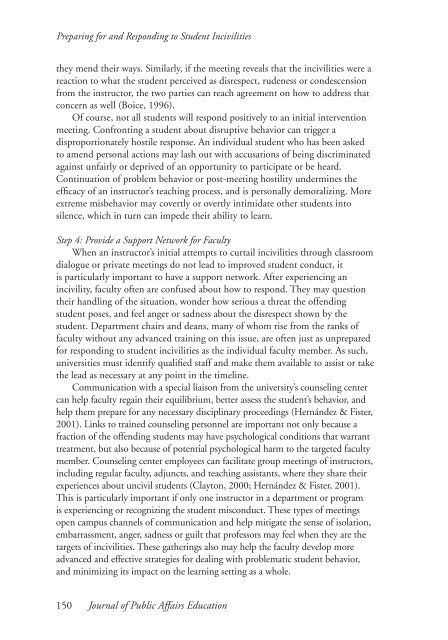JOURNAL OF PUBLIC AFFAIRS EDUCATION - Naspaa
JOURNAL OF PUBLIC AFFAIRS EDUCATION - Naspaa
JOURNAL OF PUBLIC AFFAIRS EDUCATION - Naspaa
You also want an ePaper? Increase the reach of your titles
YUMPU automatically turns print PDFs into web optimized ePapers that Google loves.
Preparing for and Responding to Student Incivilitiesthey mend their ways. Similarly, if the meeting reveals that the incivilities were areaction to what the student perceived as disrespect, rudeness or condescensionfrom the instructor, the two parties can reach agreement on how to address thatconcern as well (Boice, 1996).Of course, not all students will respond positively to an initial interventionmeeting. Confronting a student about disruptive behavior can trigger adisproportionately hostile response. An individual student who has been askedto amend personal actions may lash out with accusations of being discriminatedagainst unfairly or deprived of an opportunity to participate or be heard.Continuation of problem behavior or post-meeting hostility undermines theefficacy of an instructor’s teaching process, and is personally demoralizing. Moreextreme misbehavior may covertly or overtly intimidate other students intosilence, which in turn can impede their ability to learn.Step 4: Provide a Support Network for FacultyWhen an instructor’s initial attempts to curtail incivilities through classroomdialogue or private meetings do not lead to improved student conduct, itis particularly important to have a support network. After experiencing anincivility, faculty often are confused about how to respond. They may questiontheir handling of the situation, wonder how serious a threat the offendingstudent poses, and feel anger or sadness about the disrespect shown by thestudent. Department chairs and deans, many of whom rise from the ranks offaculty without any advanced training on this issue, are often just as unpreparedfor responding to student incivilities as the individual faculty member. As such,universities must identify qualified staff and make them available to assist or takethe lead as necessary at any point in the timeline.Communication with a special liaison from the university’s counseling centercan help faculty regain their equilibrium, better assess the student’s behavior, andhelp them prepare for any necessary disciplinary proceedings (Hernández & Fister,2001). Links to trained counseling personnel are important not only because afraction of the offending students may have psychological conditions that warranttreatment, but also because of potential psychological harm to the targeted facultymember. Counseling center employees can facilitate group meetings of instructors,including regular faculty, adjuncts, and teaching assistants, where they share theirexperiences about uncivil students (Clayton, 2000; Hernández & Fister, 2001).This is particularly important if only one instructor in a department or programis experiencing or recognizing the student misconduct. These types of meetingsopen campus channels of communication and help mitigate the sense of isolation,embarrassment, anger, sadness or guilt that professors may feel when they are thetargets of incivilities. These gatherings also may help the faculty develop moreadvanced and effective strategies for dealing with problematic student behavior,and minimizing its impact on the learning setting as a whole.150 Journal of Public Affairs Education
















